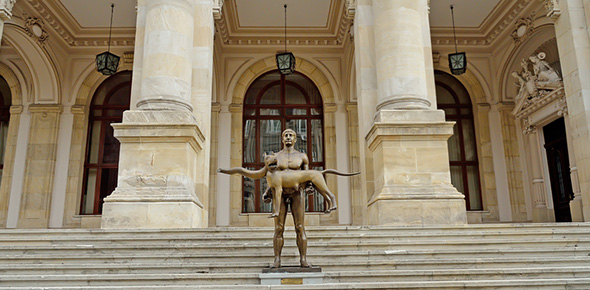Related Flashcards
Related Topics
Cards In This Set
| Front | Back |
|
Neo-liberalism
|
Neoliberalism is a contemporary political movement advocating economic liberalizations,free trade and open markets. Neoliberalism supports the privatization of nationalized industries, deregulation, and enhancing the role of the private sector in modern society.
|
|
Reglobalization
|
1. global economic transactions quickened dramatically after WWII 2. world trade skyrocketed ($57 billion in 1947; over $7 trillion in 2001) 3. money became highly mobile globally a. foreign direct investment (FDI), especially after 1960 b. short-term investment in foreign currencies or stocks c. international credit cards, allowing easy transfer of money to other countries 4. central to the process are transnational corporations (TNCs), huge global businesses that operate in many countries simultaneously a. some TNCs have greater economic clout than many countries b. by 2000, 51 of the world’s 100 largest economic units were TNCs, not countries 5. large numbers of workers, both laborers and professionals, have moved all over the world from poor countries to richer ones a. millions more people have sought refuge in the West from oppression or civil war at home b. hundreds of millions of short-term international travelers and tourists |
|
Transnational corporatation
|
Huge global businesses that operate in many countries simultaneously a. some TNCs have greater economic clout than many countries b. by 2000, 51 of the world’s 100 largest economic units were TNCs, not countries
|
|
North/South Gap
|
sharp conflicts between the Global North and South a. Northern efforts to control pollution and global warming could limit the South’s industrial development b. developing countries perceive developed ones as unwilling to give up their advantages (e.g., U.S. refusal to ratify Kyoto protocol) c. controversy over export of hazardous wastes by rich countries
|
|
Antiglobalization
|
The anti-globalization movement, or counter-globalisation movement, is critical of theglobalization of corporate capitalism. The movement is also commonly referred to as the global justice movement,alter-globalization movement, anti-globalist movement, anti-corporateglobalization movement or movement against neoliberal globalization.
|
|
Prague Spring
|
Communist world: attempt to give socialism a human face in Czechoslovakia (“Prague Spring,” 1968)
|
|
Che Guevara
|
Third-world ideology exemplified by Che Guevara (d. 1967): effort to replicate the liberation of the Cuban revolution through guerrilla warfare in Africa and Latin America
|
|
Second wave feminism
|
Second Wave Feminism, also called The Feminist Movement, or the Women's Liberation Movement, is a period of feminist activity in the United States which began during the early 1960s and lasted through the late 1990s.Whereas first-wave feminism focused mainly on overturning legal obstacles to gender equality (i.e. voting rights, property rights), second-wave feminism broadened the debate to a wide range of issues: sexuality, family, the workplace, reproductive rights, de facto inequalities, and official legal inequalities
|
|
Fundamentalism
|
“fundamentalism” is a major reaction against modernization and globalization
the term “fundamentalism” comes from U.S. religious conservatives in the early twentieth century; called for a return to the fundamentals of Christianity
|
|
Hindutva
|
Hindutva (Hindu nationalism), developed in India in the 1980s a. formed a political party (Bharatiya Janata Party) b.opposed state efforts to cater to Muslims, Sikhs, and the lower castes c.BJP promoted a distinct Hindu identity in education, culture, and religion
|
|
Islamic renewal
|
Islamic fundamentalism is the most prominent fundamentalism of the late twentieth century a. Osama bin Laden and the attack on the World Trade Center on September 11, 2001 b. WTC destruction is only one sign of a much bigger phenomenon
|
|
Osama Bin Laden/al-Qaeda
|
a. Osama bin Laden and the attack on the World Trade Center on September 11, 2001 b. WTC destruction is only one sign of a much bigger phenomenon |
|
Global warming
|
by 2000, scientific consensus on the occurrence of “global warming” as the result of burning of fossil fuels and loss of trees
|
|
Environmentalism
|
1. environmentalism began in the nineteenth century as a response to the Industrial Revolution but did not draw a mass following 2. environmentalism only became a global phenomenon in the second half of the twentieth century a. began in the West with Rachel Carson’s Silent Spring (1962) b. impetus for action came from the grass roots and citizen protest c. in Germany, environmentalists entered politics as the Green Party 3. environmentalism took root in developing countries in 1970s–1980s
|





